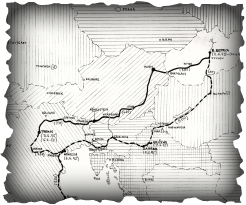In autumn 1990, I was among the first Westerners - and recent college grads - to evade the real world for a couple of years by teaching English in what was then Czechoslovakia. My assignment was in Martin, a town of 50K in the mountains, which turned out to be the home of Slovak nationalism. Barriers to communication, often cultural as well as linguistic, provided tons of material for my upcoming memoir, Slovakian Rhapsody, as this excerpt illustrates.

One day Dagmar handed me an invitation to a genealogical society lecture at Matica slovenská, the Slovak cultural institution whose world-wide headquarters was just three blocks away, in a high-rise visible from my office window.
“I am sure you will be interested, since it is on the family of Ján Polerecký,” she said, her round face displaying a wide-eyed grin, as if expecting me to gasp in delight.
I hated to disappoint her, but all I could say was, “Who?”
“YAHN POH-le-ret-skee.” She spread her arms as if introducing a celebrity.
“Sorry, I don’t know who that is.”
“You mean to tell me,” she sputtered, intonation rising wildly, accent thickening, “you don’t know who is the heerrro of the Amerrrican Rrrevolution?”
Ján Po-WHO-sky? The hero of the American Revolution? Did she really believe that some Slovak bumpkin had singlehandedly beat the redcoats? Had the commies drummed this nonsense into their heads for the last forty years? Or had the nationalists over at Matica been spreading it in the past year?
Then I realized: My God—she thinks I’m worse than the teens of my generation who flocked to shoot-em-up Rambo flicks but didn’t know Saigon from Senegal. How am I going to convince her I don’t come from a nation of media-soaked morons?
“But George Washington was the hero of the American Revolution,” I finally responded.
“Well, it says right here that Polerecký was the hero of the American Revolution,” she replied curtly, thumping my invitation – a dot-matrix-printed, unevenly cut strip of paper – like a certificate of authenticity.
I squinted at it: “Ján Polerecký, hrdina americkej revolucie.” “Hero of American Revolution,” I deciphered, straining my linguistic knowledge. No a, an orthe—there are no articles in Slovak. I knew that much from two months of studying mail-order grammar books. This phrase is ambiguous.
I regained composure at last. “Well, Polerecký may have been a hero of the revolution, but he certainly wasn’t the hero. George Washington, was the main hero. And then there was Paul Revere. And the Marquis de Lafayette—he was French but helped us defeat Cornwallis at Yorktown in 1781. Yorktown’s in Virginia, you know, I grew up not far from there.” I threw in every name, date and fact I could muster.
Lacking a response, she turned towards her own desk, looking at me out of the corner of her eye. “So, will you attend the lecture?”
“Yes.”
 RSS Feed
RSS Feed